Child-Friendly Chores and Responsibilities That Teach Lifelong Skills
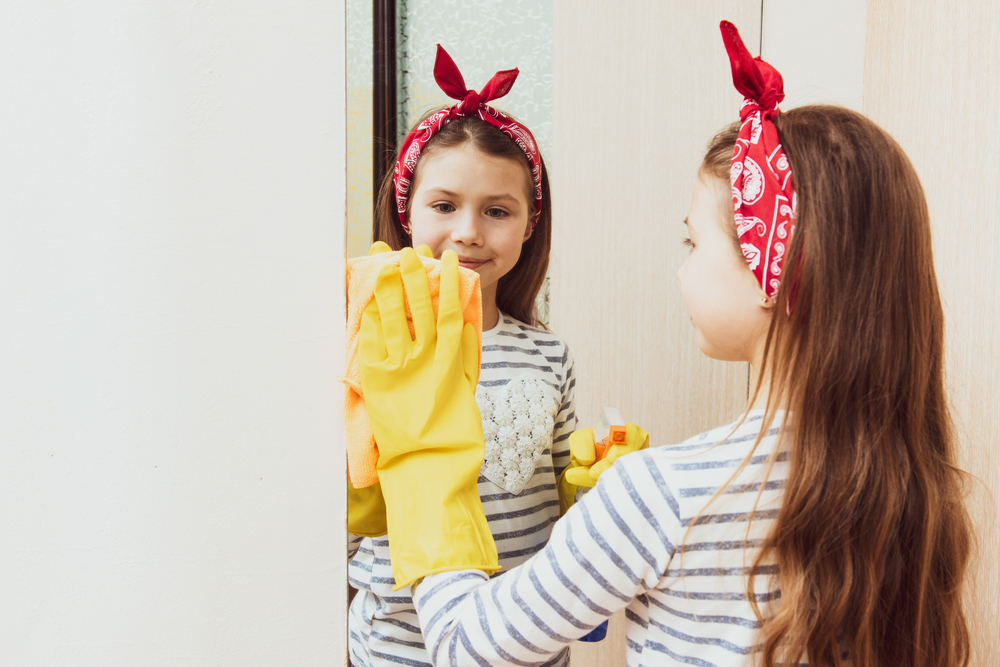
Finding age-appropriate chores to teach your children lifelong skills like organization, teamwork, and responsibility can be tricky. We’ve compiled a list of chore ideas for kids that are perfect for every age to handle.
Contents:
- The Value of Chores for Children
- How to Get Children Involved in Chores
- Age-Appropriate Chores for Children
- What to Avoid When Introducing Chores for Kids
- The Bottom Line: Set Your Children Up for Success with Age-Appropriate Chores
- FAQs
The Value of Chores for Children

Prostock-studio/Shutterstock.com
Do you remember the first time your parents asked you to help around the house? Maybe it was making your bed in the morning or setting the table for dinner. These child-friendly chores and responsibilities helped shape you into the organized and functional parent you are today!
Now, it’s time to teach these lifelong skills to your children through age-appropriate chores and responsibilities.
Chores aren’t simply about keeping the house clean. They are invaluable tools for teaching children about responsibility, teamwork, and the importance of contributing to a shared family living environment. They instill lifelong skills such as organization and cleanliness that your child will carry well into adulthood.
When you decide to start considering chores for children, you may be faced with a difficult question. What child-friendly chores are suitable for your child’s age group?
Certain chores are more appropriate for certain ages than others. Based on the capabilities of your child, both physically and mentally, it’s important to teach them age-appropriate chores.
We’ve done a deep dive and created a list of chores for kids that you can start implementing today!
How to Get Children Involved in Chores
There’s no doubt that engaging your child in household chores can be a bit of a challenge, but the benefits far outweigh the initial effort.
It’s never too early to introduce chores. Of course, the kind of chores will depend on their age and ability.
Children as young as two years old can start with simple tasks like picking up toys. As your child grows older, the complexity of chores can increase, stretching their abilities and teaching them new skills.
Introducing children to new chores can seem intimidating at first. But view it as if introducing a new food or teaching them how to brush their teeth. It’s something they will get used to.
- Make it fun: Engage your child’s natural love of play. Chores can be made into a game or a challenge; rewarding them for completing tasks quickly and thoroughly can motivate them.
- Make it routine: Children thrive on routine. Make chores a regular part of your child’s day, and they will come to expect and accept them as part of the norm.
- Constant encouragement: Praise your child for their efforts, not just completion. This fosters a sense of pride and accomplishment, making them eager to tackle the next task.
Remember, introducing your children to chores is not about creating a mini housekeeper. It’s about guiding them towards independence and responsibility and instilling good habits that will last a lifetime.
One of the best methods to involve children in household chores is to create a printable chart with a chore list for kids and when they should be done. When each chore is complete, reward your child with a fun sticker on the chart.
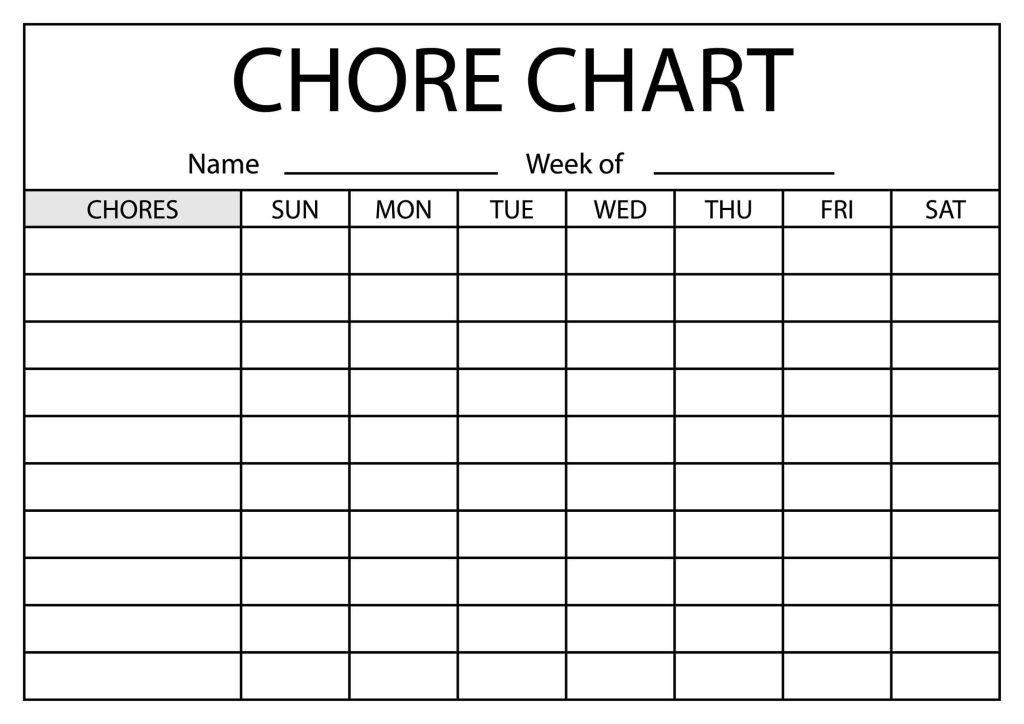
Dzm1try/Shutterstock.com
Creating a gamified experience while teaching chore responsibility makes it entertaining and rewarding for your child. It also helps incorporate these household chores for kids into their routines.
Age-Appropriate Chores for Children
Deciding to involve your children in chores is a big step. The next step is to learn appropriate kids chores by age.
Whether you’re deciding to start early or when your child is already in kindergarten, there are certain chores that are better suited for certain age groups.
Below is a breakdown of chores by age to help guide you when implementing new responsibilities into your home.
Toddlers (2 to 4-Year-Olds)

Yuganov Konstantin/Shutterstock.com
Setting your toddlers on the path to responsibility can begin early with simple and easy age-appropriate chores.
Assigning tasks that can be performed by children as young as two or three not only promotes learning through hands-on experience but also cultivates important skills they’ll utilize throughout their life.
Here’s a list of practical and achievable chores for toddlers:
| Chore | Skill Developed |
| Putting Toys Away | Organization and Cleanliness |
| Feeding Pets | Responsibility |
| Helping with Laundry | Coordination and Organization |
⠀
Remember to make these tasks fun and engaging.
Start with less complicated tasks and gradually upgrade as they comprehend and master them. Always appreciate their little efforts; it boosts their confidence.
Kindergarteners (5 to 6-Year-Olds)
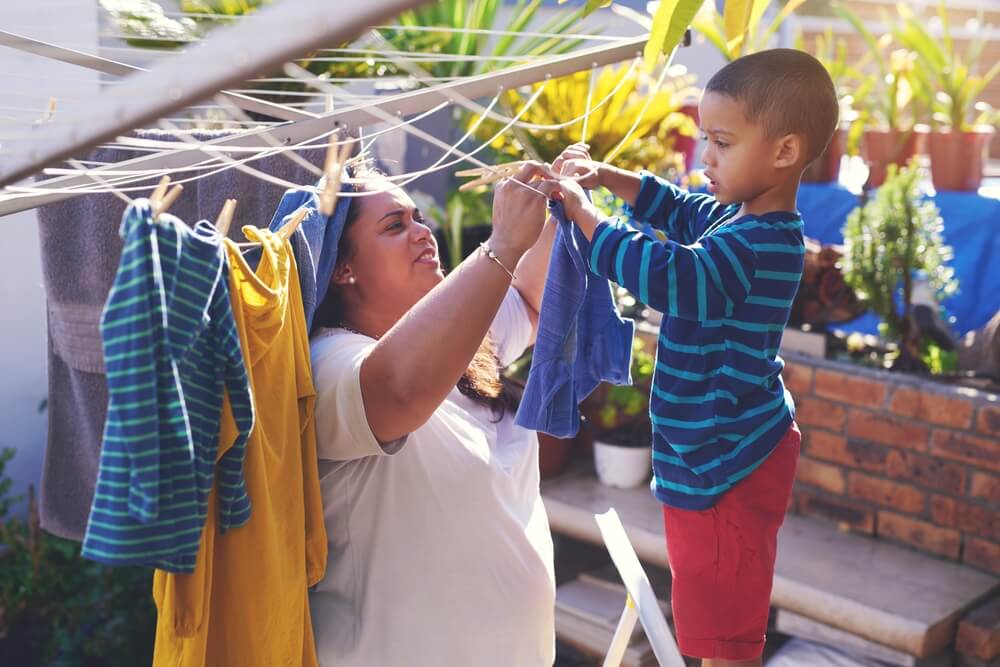
PeopleImages.com – Yuri A/Shutterstock.com
For kindergarteners ages 5 to 6, simple tasks that involve physically tangible results can be most beneficial. Share with them the basic skills necessary for daily life while keeping tasks age-appropriate as well as rewarding.
Below is a list of chores that are typically suitable for preschoolers. Remember, every child is unique and develops at their own pace, so adjust as necessary.
| Chore | Skill Developed |
| Setting the Table | Carefulness and Responsibility |
| Dressing Themselves | Independent Decision Making |
| Straightening Up Their Room | Organization and Cleanliness |
| Make Their Bed | Responsibility and Cleanliness |
⠀
Remember, the key here is to start small and gradually increase the complexity of chores as your preschooler grows and develops. Be patient, supportive, and make the process fun!
Elementary Schoolers (7 to 12 Year-Olds)

Kmikhidov/Shutterstock.com
As your child continues to grow, so too will their capacity to help around the house. In fact, kids between the ages of 7 to 12 are quite capable of tackling more demanding chores. It is during this stage that they can truly start to learn valuable lifelong skills such as responsibility, teamwork, and organization.
By assigning them appropriate chores, they will not only play an active role in maintaining the household, but they’ll also acquire skills that will prove vital in the future.
Here are a few age-appropriate chores for your elementary schooler:
| Chore | Skills Developed |
| Washing the Dishes | Hygiene and Cleanliness |
| Helping Prepare Meals | Teamwork and Responsibility |
| Organizing Laundry | Organization |
| Gardening and Raking Leaves | Patience and Responsibility |
⠀⠀
Remember, the goal is not to burden your child with workload but to gradually equip them with important skills they’ll use throughout their lifetime. Start with one or two chores and slowly increase once they gain more confidence and efficiency.
At this age, it’s especially important to ensure your child’s safety as they begin to take more independent steps, such as going to school or playing without parental supervision. To alleviate your concerns and always be ready to assist, consider installing the Findmykids app. With it, you’ll always know your child’s whereabouts and what’s happening around them!
Teenagers (13 to 18 Year-Olds)
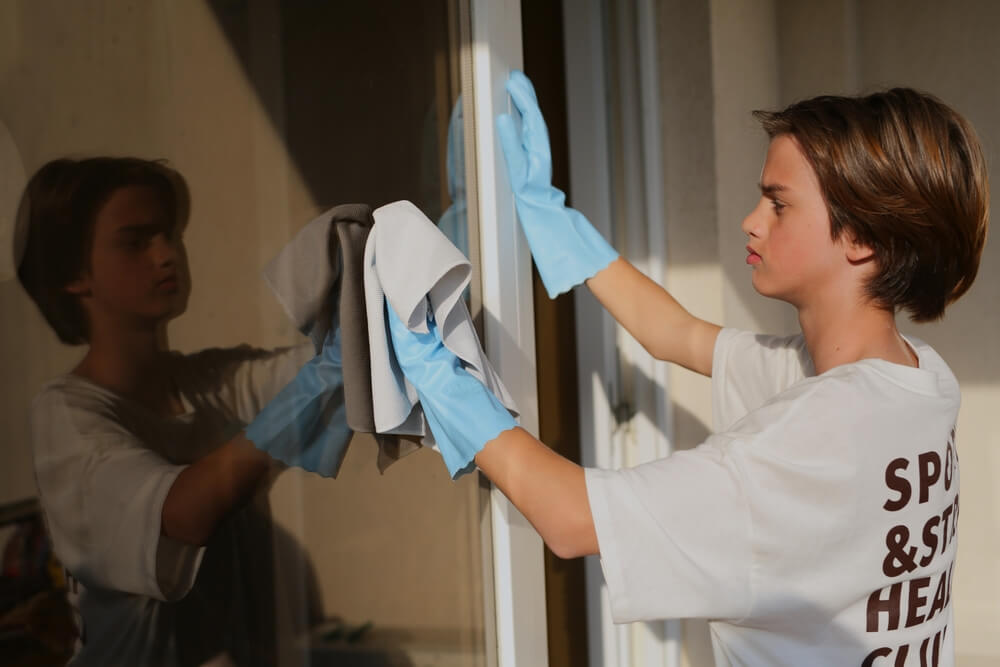
Mariia Masich/Shutterstock.com
As your children enter their teenage years, their abilities and maturity levels expand significantly. This is a great time to assign them more complex tasks and roles around the house to nurture their skill set.
Here is a list of age-appropriate chores for teens they can effectively handle:
| Chore | Skills Developed |
| Mowing the Lawn | Responsibility |
| Cooking Family Meals | Nutrition and Time Management |
| Doing Laundry | Attentiveness and Organization |
| Deep Cleaning | Cleanliness and Diligence |
| Grocery Shopping | Money Management and Responsibility |
⠀
This phase of growing up is also an ideal time to teach your teenagers about larger home maintenance tasks. They will learn skills that will push them into adulthood and eventually live on their own.
When your teenager begins to have more independence, such as running errands for you after getting their driver’s license, it’s the perfect opportunity to use the Findmykids app. You can track their movements and see where they are while grocery shopping, picking up the dry cleaning, or on their way home from school.
Remember, the central goal is not just to get help around the house but to help your teenagers develop life skills. This will help them gain the greatest benefits from engaging in household duties, whilst also building their confidence and sense of responsibility.
What to Avoid When Introducing Chores for Kids

Mangkorn Danggura/Shutterstock.com
Introducing chores to your kids is not only about teaching them life skills, but also about nurturing in them a sense of responsibility and accountability.
Yet, it’s a task that needs a thoughtful approach. Here are some common pitfalls to avoid and strategies to adopt when introducing chores to your kids.
- Don’t Overwhelm Them: It’s important to start slowly by assigning simple tasks. Rushing them with too many responsibilities can lead to anxiety and pushback.
- Don’t Select Chores That Aren’t Age-Appropriate: Assigning tasks that are beyond the ability of your child can discourage them and bring about a negative association with chores.
- Don’t Take it Too Serious: Turn chores into a game or add rewards for completing them. This will make your kids look forward to doing their chores, rather than dreading them.
- Don’t Be Inconsistent: Consistency will help establish chores as a normal part of everyday life, and over time, your child will understand and accept them as part of their routine.
- Don’t Rush: Children may require some time to adjust to their new tasks. Displaying patience can help them to accept and adapt to their new responsibilities.
- Personal Responsibility: Teach them chores are a shared responsibility. Express your thanks when they complete their task, this will increase their sense of personal responsibility.
- State Expectations: Clear, direct communication about what is expected from them can reduce resistance.
- Incentives: Offering small rewards for tasks well done can motivate children to accept and complete chores.
If the responsibility of chores is introduced patiently and steadily, it can bring about much-needed skills and traits in children that they can use throughout their lives.
The Bottom Line: Set Your Children Up for Success with Age-Appropriate Chores
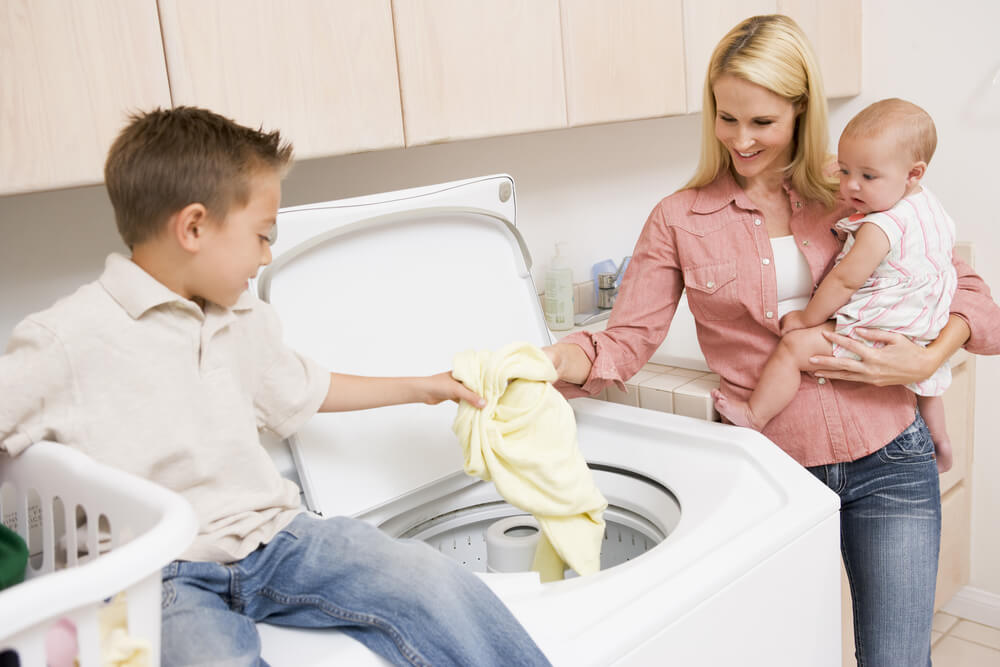
Monkey Business Images/Shutterstock.com
The top priority parents have is to keep their children safe and teach them the valuable life skills they will need to succeed in life.
There are two ways of achieving these goals:
- Introduce age-appropriate chores for children while young to teach lifelong skills.
- Keep them safe with the Findmykids App and know where they are at all times.
By assigning age-appropriate chores for kids and tracking their location with the Findmykids app or smartwatch, you will teach your children ultimate responsibility and honesty.
Through fulfilling daily or weekly chores and sharing their location, you will have the peace of mind that they are safe and nurturing the skills they need to succeed in life.
FAQs
What Is a Good Chore for Kids?
Good chores for kids are based on their ages and abilities. When assigning chores to your children, ensure they are age-appropriate and that your child is capable of completing them without difficulty or harm.
Why Is It Important for Kids to Have Chores and Responsibilities?
Teaching children responsibility through chores at a young age will help them develop the necessary skills to succeed in life. When time management, responsibility, organization, teamwork, cleanliness, and hygiene are instilled in children, they are set with essential skills and habits needed in adulthood.
What Are the Ten Responsibilities of a Child at Home?
While each family has different household chores, there are ten typical responsibilities children should have at home:
- Make the bed
- Pick up toys
- Get dressed
- Brush teeth
- Pick up bedroom
- Clearing the table after meals
- Putting dirty clothes in a hamper
- Cleaning up spills or messes
- Feeding pets
- Respecting and listening to parents
The picture on the front page: Iren_Geo/Shutterstock.com
Проверьте электронный ящик



















